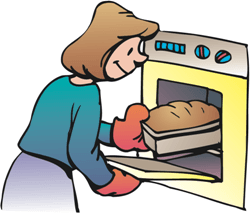English Participle Phrases
Before we learn English participle phrases, click here to review English grammar phrases.
Click Here for Step-by-Step Rules, Stories and Exercises to Practice All English Tenses
| Quick Tips: A participle is a
form of the verb that is used together with another
verb to form certain tenses, or alone as an
adjective.
ExamplesIn the following sentences the participle is used together with a helping verb to form progressive and perfect tenses (the participle is in bold, the helping verb is underlined):
|
What is a participle phrase?
A participle phrase is a group of words in a sentence that acts like an adjective and starts with a participle. In other words, it includes the participle and the words related to it.It usually follows the noun or pronoun which it describes.
Examples (the participle phrase is in bold, the participle is underlined, the noun or pronoun which the participle describes is red):
- We saw the rock
falling down
the hill.
- Taking off
his hat, Sam
entered the room.
- People
taken
hostage experience great stress.
- Being a
translator, Jim
is fluent in both English and French.
- Having been
there, Monica knew the truth.
- The dog
barking
behind the fence was big and scary.
- John found his sister
sleeping on
the couch.
- The person
chosen to
represent us will leave tomorrow morning.
- Falling down the rabbit hole, Alice thought about her life.
Correct usage of participle phrases
Location
You should place the participle phrase as close as possible to the noun or pronoun it describes. You should also clearly mention the noun or pronoun.If you don't, the sentence becomes unclear and confusing.
Examples (the participle phrase is underlined, the noun or pronoun it describes is in bold):
- Screaming
with joy, Janet
bounced up and down.
("Janet" comes right beside "screaming with joy," so Janet is the one screaming with joy.)
- Bouncing
up and down, the
ball made a series of sounds.
("The ball" comes right beside "bouncing up and down," so the ball is the one bouncing up and down.)
- Bouncing
up and down, Janet
had the ball.
("Janet" comes right beside "bouncing up and down," so in this sentence Janet is the one bouncing up and down.)

Here are some incorrect examples (the participle phrase is underlined, the noun or pronoun it describes is in bold):
- Incorrect: Lying on the grass,
the stars
sparkled above us.
(This sentence actually tells us that the stars were lying on the grass, which is not the case.) - Correct:
Lying on the
grass, we looked at the stars that sparkled above us.
- Incorrect: Beaten up beyond repair,
my brother sold
his car.
(This sentence actually tells us that my brother was beaten up beyond repair, which is not the case.) - Correct:
Beaten up
beyond repair, the
car was sold by my brother.
- Incorrect:
Smiling to
herself, the cake was baking in the oven.
(The noun/pronoun that the participle phrase describes is completely missing. The sentence is not clear.) - Correct: Smiling to herself, Daisy put the cake in the oven.

Punctuation – at the beginning of a sentence
When a participial phrase comes at the beginning of a sentence, you should use a comma after it.
Examples (the participle phrase is underlined):
- Thrown through the window, the rock fell on the floor.
- Running out the door, I forgot to turn off the light.
- Eating all that candy, Sarah became extremely fat.
- Holding
all these bags, Susan couldn't see a thing.

Punctuation – at the end of a sentence
If the noun/pronoun that the participle phrase describes is right before it – don't use a comma.
Examples (the participle phrase is underlined, the noun/pronoun it describes is in bold):- We saw Robert fixing his car.
- I found my cat sleeping on my pillow.
- You noticed him taking the bus.
- They heard Helga
singing joyfully.

If the noun/pronoun that the participle phrase describes is
NOT right before it – use a comma.
- Kelly thanked Paul, touched by his generosity.
- We ate in silence, worried about the future.
- Mark brought a small gift, encouraged by the news.
- They
sang happily, forgetting
the past and looking forward to the future.

Punctuation – in the middle of a sentence
Essential participle phrase
An essential participle phrase gives us information that is necessary to the meaning of the sentence. It wouldn't be complete without it.In such cases, do not use commas before and after the participle phrase.
Examples (the participle phrase is underlined):
- The athlete winning
the race will get the award.
The same sentence without the participle phrase would be:
The athlete will get the award.
This sentence alone, without any additional explanation, may be considered incomplete in meaning (too general). We can't know who that person is.
Therefore, the participle phrase is an essential part of the sentence, and we don't put commas around it.
- The woman struck
by the ball is my boss.
The same sentence without the participle phrase would be:
The woman is my boss.
This sentence alone, without any additional explanation, may be considered incomplete in meaning (too general). We can't know who that person is.
Therefore, the participle phrase is an essential part of the sentence, and we don't put commas around it.

Non-essential participle phrase
By "non-essential" participle phrase we mean a participle phrase that is not completely necessary. The sentence will be understood without it.In such cases, use commas before and after the participle phrase.
Examples:
- Mike, swinging
his arms, passed the finish line and won the race.
The same sentence without the participle phrase would be:
Mike passed the finish line and won the race.
This sentence alone, without any additional explanation, is quite clear. We know who we are talking about.
Therefore, the participle phrase is not an essential part of the sentence, so we should put commas around it.
- Monica, struck
by the ball, fell to the ground.
The same sentence without the participle phrase would be:
Monica fell to the ground.
This sentence alone, without any additional explanation, is quite clear. We know who we are talking about.
Therefore, the participle phrase is not an essential part of the sentence, so we should put commas around it.

Get Updates, Special Offers, and English Resources
Download your FREE GIFT (the first two chapters of
English Short Stories Book and Workbook)
as soon as you join!

By submitting your email, you consent to receiving updates and newsletters from us and to the sharing of your personal data with third parties for the purposes of sending you communications. We will not spam you. You can unsubscribe at any time. For more information, please see our privacy policy.
Return from English Participle Phrases to Easy English Grammar
Return from English Participle Phrases to Learn to Write in English





